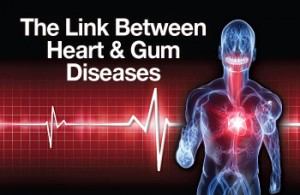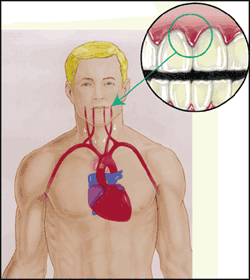This blog post is part of a series of Total Health Dental Care articles to inform our readers about the connection between your oral health and your overall health.
It’s called the “Mouth-Body Connection,” and it means that poor dental health can severely deteriorate your body, especially your lungs and heart, and it can also lead to a host to other conditions including rheumatoid arthritis, strokes and even some Cancers.
An ischemic stroke (the most common type) happens when a blood vessel that feeds the brain gets blocked, usually from a blood clot. When the blood supply to a part of the brain is shut off, brain cells will die. The result is the inability to carry out normal brain functions such as walking or talking.
Strokes & Gum Disease Statistics
- Stroke is the third leading cause of death in the US.
- Oral bacteria can affect the heart adversely by entering the blood stream, thereby reaching the heart and contributing to clot formation.
- In a recent study, people diagnosed with acute cerebrovascular ischemia (the most common type of stroke) were found more likely to have an oral infection when compared to those in the control group.
- Men and women who suffered from bleeding gums had more than twice the risk of stroke compared with those whose gums were healthy.
As you can see, research studies have discovered that oral infection is indeed a risk factor for stroke.
So, how are strokes related to your mouth? 
The number one cause of death is inflammation.
The number one cause of inflammation is gum disease.
Shocking Truth About Gum Disease: The Silent Epidemic
80% of people have Gum Disease and DO NOT KNOW IT! There is usually no pain involved for people until extremely late in the degeneration. Many gum problems will go unnoticed until they are diagnosed by a dentist.
Medications for Stokes Cause Dry Mouth
If you take any medication for stroke prevention including blood pressure medications and diuretics, you have probably experienced a common side effect of these popular medications: Dry Mouth.
The combination of two or more of these medications dramatically increase dry-mouth effects.
Dry mouth is a growing problem in dentistry. On a daily basis, Dr. Korenman and his staff see patients who suffer from dry mouth and the issues associated with dry mouth including tooth decay, gum disease and mouth sores.
The Good News for Stroke Patients
The good news is that Dr. Korenman and his team are dedicated to educating the public about the dangers of gum disease and they check all their patients for it.
If you are diagnosed with gum disease, Dr. Korenman can design a treatment plan to help you keep it under control.
Additionally, if you have suffered from a stroke, a consistent, preventive dental program is essential for survivors. The loss of senses, weakness of facial muscles, and side effects of medications can put you at high risk for dental problems.
We urge you to call Loveable Smiles for your Total Health Dental Care appointment at 972-231-0585.
This is just one of many examples of how we treat people, not just teeth.


